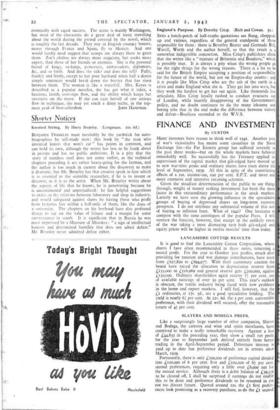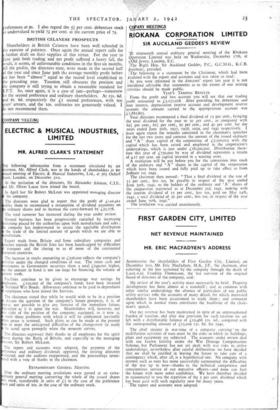FINANCE AND INVESTMENT
By CUSTOS
MOST investors have reason to think well of 1941. Another year of war's vicissitudes has meant some casualties in the Stock Exchange list—the Far Eastern group has suffered severely in the past three weeks—but on the whole markets have behaved remarkably well. So successfully has the Treasury applied its supervision of the capital market that gilt-edged have moved up to new war-time peaks and ordinary shares have risen above the level of September, 1939. All this in spite of the constricting effects of a los. income-tax, too per cent. E.P.T. and more and more extensive and intensive rationing schemes.
Given the steadfast determination of the public to see things through, weight of money seeking investment has been the main factor in this extraordinary performance in the stock markets. Latterly we have seen the growing influence in the speculative groups of buying of depressed shares on long-term recovery prospects. I do not attribute any substantial volume of this son of buying to inflation fears. What of 1942? One hesitates to compete with the tame astrologers of the popular Press. I will venture the forecast, however, that except in the unlikely event of the war taking a most dismaying turn both gilt-edged and equity prices will be higher in twelve months' time than today.
LANCASHIRE COTTC RESULTS
It is good to find the Lancashire Cotton Corporation, whose shares I have often recommended in these notes, returning a record profit. For the year to October 31st profits, struck after providing for taxation and war damage contributions, have risen from £627,820 to £694,977. With their customary caution the board have raised the allocation to depreciation reserve from L155,000 to £216,989 and general reserve gets L200,00o, against £150,000. Ordinary shareholders again receive 71 per cent. out of available earnings of over 3o per cent. This year's outlook is obscure, the textile industry being faced with new problems in the home and export markets. I still feel, however, that the Li ordinaries, at zjs. 3d., are a good speculative holding. The yield is nearly 61 per cent. At 22S. 6d. the 5 per cent. convertible preference, with their dividend well secured, offer the reasonable return of 41 per cent.
SLATERS AND BODEGA PREFS.
Like a surprisingly large number of other companies, Slaters and Bodega, the caterers and wine and spirit merchants, have contrived to make a really remarkable recovery. Against a loss of £44,833 in the preceding year, they show a small net profit for the year to September 3oth derived entirely from better trading in the April-September period. Debenture interest is paid up to date but preference dividends are in arrears since March, 1939.
Fortunately, there is only £200,000 of preference capital divided into Lioo,000 of 6 per cent. first and Lioo,000 of 6f per cent. second preferences, requiring only a little over L6,0oo net for the annual service. Although there is a debit balance of £39,359
to be cleared off, I shall be surprised if earnings do not enable this to be done and preference dividends to be resumed in the not too distant future. Quoted around ros. the Li first prefer- ences look promising as a recovery purchase, as do the Li second
preferences at 9s. I also regard the 54 per cent. debenture stock s undervalued to yield 74 per cent. at the current price of 75.
BRITISH CELANESE PROSPECTS
Shareholders in British Celanese have been well schooled in he exercise of patience. Once again the annual report calls for further draft on their supplies of this virtue. For the year to une 30th both trading and net profit suffered a heavy fall, the esult, it seems, of unfavourable conditions in the first six months. 11 the profits, the directors state, were made in the second half >f the year and since June 30th th,: average monthly profit before ax has been " almost " equal to the record level established in he preceding year. Taxation__ still obscures the position and he company is still trying to obtain a reasonable standard for .P.T. So, once again, it is a case of jam—perhaps—tomorrow or the second preference and ordinary shareholders. At 15s. 6d. nd 6s. 6d. respectively the £r second preferences, with ten ears' arrears, and the iris. ordinaries are generously valued. I
o not recommend them.



























 Previous page
Previous page